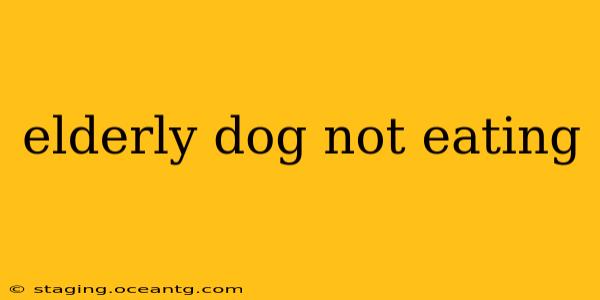As our canine companions age, they often experience changes in their appetite and eating habits. A senior dog refusing food can be a serious concern, signaling potential underlying health issues. This comprehensive guide explores the reasons behind decreased appetite in older dogs, offering insights to help you understand and address this problem. Understanding the situation early is crucial for ensuring your beloved friend receives the necessary care.
What are the common reasons why senior dogs stop eating?
Many factors contribute to decreased appetite in senior dogs. These range from simple, easily treatable issues to more serious medical conditions requiring veterinary intervention. Common reasons include:
-
Dental Problems: Tooth decay, gum disease, or missing teeth can make eating painful and difficult. Even minor discomfort can significantly reduce a dog's desire to eat.
-
Gastrointestinal Issues: Conditions like inflammatory bowel disease (IBD), pancreatitis, or cancer can cause nausea, vomiting, and loss of appetite.
-
Kidney Disease: Chronic kidney disease (CKD) is prevalent in older dogs and can lead to a decreased appetite, weight loss, and increased thirst.
-
Liver Disease: Similar to kidney disease, liver problems can impact a dog's metabolism and appetite.
-
Arthritis and Mobility Issues: Pain from arthritis can make it difficult for a senior dog to reach their food bowl or eat comfortably.
-
Medication Side Effects: Certain medications can have a decreased appetite as a side effect.
-
Cognitive Dysfunction: Similar to dementia in humans, canine cognitive dysfunction syndrome (CDS) can affect appetite and eating habits.
-
Changes in Taste and Smell: As dogs age, their senses of taste and smell can diminish, making food less appealing.
My elderly dog is suddenly not eating; should I be worried?
Yes, a sudden decrease or complete loss of appetite in an elderly dog warrants immediate veterinary attention. This is especially true if accompanied by other symptoms such as vomiting, diarrhea, lethargy, weight loss, or changes in urination or defecation. Do not delay seeking professional veterinary care.
How can I encourage my elderly dog to eat?
While veterinary intervention is crucial for underlying medical issues, there are steps you can take to encourage your senior dog to eat:
-
Offer smaller, more frequent meals: Instead of large meals, try offering several smaller meals throughout the day.
-
Warm the food: Slightly warming the food can enhance its aroma, making it more appealing.
-
Try different foods: Experiment with different flavors, textures, and types of food to find something your dog enjoys. Consider adding low-sodium broth or a small amount of plain, cooked chicken or beef. Consult your vet before making significant dietary changes.
-
Hand-feeding: Some senior dogs respond well to hand-feeding, as it provides comfort and reassurance.
-
Elevate the food bowl: This can make eating more comfortable for dogs with arthritis.
-
Use enticing food toppers: A small amount of wet food, yogurt, or peanut butter (xylitol-free!) can make dry kibble more attractive.
What are some signs of an underlying medical condition in my elderly dog who won't eat?
Beyond loss of appetite, look out for these warning signs:
-
Weight loss: Even a small amount of weight loss can be significant in senior dogs.
-
Lethargy and weakness: Reduced energy levels and difficulty moving.
-
Vomiting and diarrhea: These indicate digestive upset and could be a symptom of several serious conditions.
-
Excessive thirst or urination: This could point to kidney problems.
-
Changes in behavior: Increased anxiety, confusion, or aggression.
-
Difficulty breathing: This could be a sign of heart or lung problems.
How does a vet diagnose the cause of decreased appetite in elderly dogs?
Your veterinarian will conduct a thorough physical examination, review your dog's medical history, and likely run some diagnostic tests, including blood work, urinalysis, and potentially X-rays or ultrasound. These tests help identify underlying medical conditions contributing to the loss of appetite.
Can I give my elderly dog human food to encourage eating?
Generally, it's best to avoid giving your dog human food. Many human foods are toxic to dogs, and even seemingly harmless foods can upset their stomachs. Always consult your veterinarian before making any significant changes to your dog's diet.
Remember, a decreased appetite in an elderly dog is not something to take lightly. Early detection and treatment are essential for improving your dog's comfort and quality of life. Regular veterinary checkups are vital for monitoring the health of senior dogs and addressing any concerns promptly. By working closely with your veterinarian, you can help your aging canine companion live a happy and healthy life for as long as possible.
